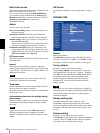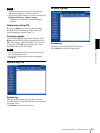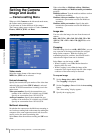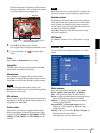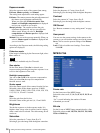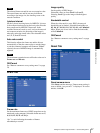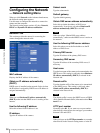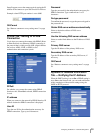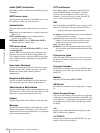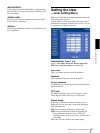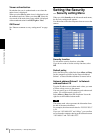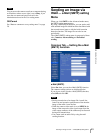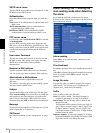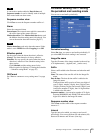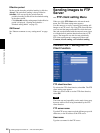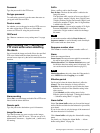
Administrating the Camera
Configuring the Network — Network setting Menu
40
e-Mail (SMTP) notification
Select On to send an e-Mail when the DHCP setting is
completed.
SMTP server name
Type the name or IP address of the SMTP server to use
for sending an e-Mail, up to 64 characters.
Authentication
Select the authentication required when you send an e-
Mail.
None: Select if no authentication is required when an e-
Mail is sent.
SMTP authentication: Select if authentication is
required if an e-Mail is sent.
POP before SMTP: Select if POP before SMTP is
required when an e-Mail is sent.
POP server name
It is necessary when the POP before SMTP is selected
in Authentication.
Type the POP (receiving mail) server name up to 64
characters. Or type the IP address of the POP server.
This setting is necessary when the SMTP server which
sends e-Mails performs authentication using the POP
user account.
User name, Password
Type the user name and Password of the user who has
the mail account. This setting is necessary when the
SMTP server which sends e-Mails performs
authentication.
Recipient e-Mail address
Type the recipient e-Mail address up to 64 characters.
You can specify only one recipient e-Mail address.
Administrator e-Mail address
Type the e-Mail address of the camera administrator, up
to 64 characters. This is used as the reply address or the
address for a system mail from the mail server.
Subject
Type the subject/title of the e-Mail up to 64 characters.
Message
Type the text of the e-Mail up to 384 characters. (A line
break is equivalent to 2 characters.) You can describe
the information of the acquired IP address, etc. using the
special tags mentioned below.
HTTP notification
Select On to output a command to the HTTP server
when the DHCP setting is completed. Using this
function, you can configure a useful system, for
example, to view the access log stored in the HTTP
server or start an external CGI program.
URL
Specify the URL to send HTTP request, using up to 256
characters. The URL is normally written as follows:
http://ip_address[:port]/path?parameter
ip_address: Type the IP address or host name of the host
to which you want to connect.
[:port]: Specify the port number to which you want to
connect. If you want to use the well-known port
number 80, you do not need to input this value.
path: Type the command.
parameter: Type the command parameter if necessary.
You can use the special tags mentioned below for the
parameters.
Proxy server name
When you send HTTP request via a proxy server, type
the name or IP address of the proxy server, using up to
64 characters.
Proxy port number
Specify the port number when you send HTTP request
via the proxy server. Set a port number between 1024
and 65535.
Method
Select the HTTP method GET or POST.
OK/Cancel
See “Buttons common to every setting menu” on page
29.
About the special tags
You can use the following five special tags to allow the
notification of the settings acquired by the DHCP, such
as an IP address. Type the tags in the parameter section
of the URL that you described in the Message field of
the HTTP.
<IP>
Use this tag to embed the IP address acquired by the
DHCP in the text or parameter.
<HTTPPORT>
Use this tag to embed the specified HTTP server port
number in the text or parameters.



